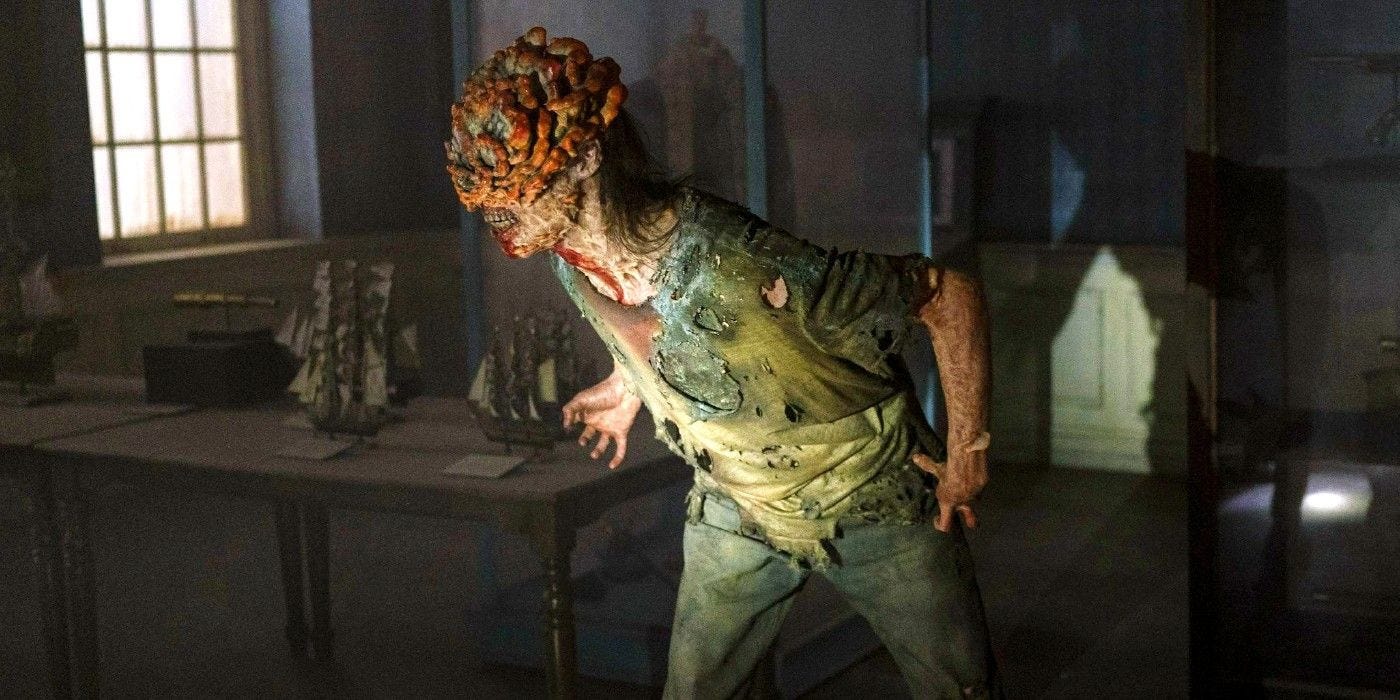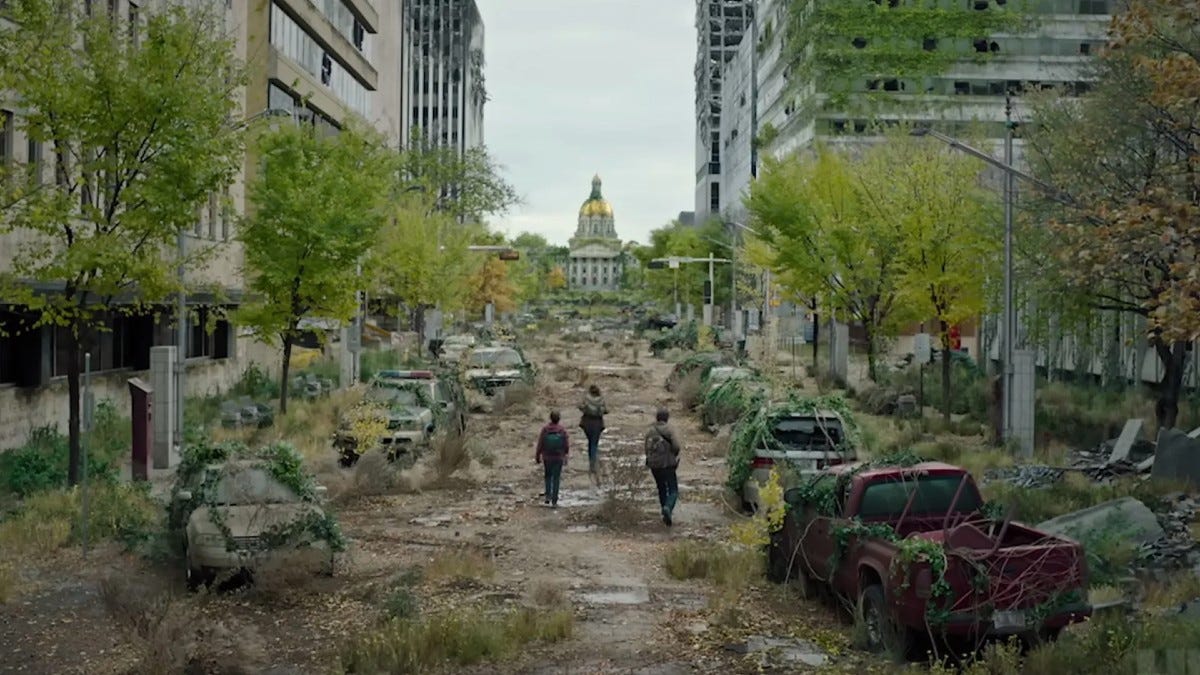NEW STANDARD DISCLAIMER: This newsletter aggressively spoils things.
I was never a fan of The Last of Us the video game, mainly because the third-person POV gave me headaches and also too I have the hand-eye coordination of a large rock1. Plus, there are a lot of cutscenes in this game and while they are well done and the voice-acting is solid, they remain cutscenes. If I wanted to watch a bunch of cutscenes about the zombie apocalypse I would have just watched some Walking Dead reruns as they contain approximately the same entertainment value2. So: The game itself was nothing extraordinary, but the story was better than most games, and offered a nice twist at the end, and thus a classic was (apparently) born3.
But I can see why it was developed into a series for HBO. It’s already a complete narrative—it has characters, world-building, unique imagery, and a story. It’s iconic in its sphere and guaranteed an audience and a lot of attention. The end result, with Pedro Pascal as Joel and Bella Ramsey as Ellie, is good!
Thanks for reading.
Next week: Why Everyone But Me is Wrong About Everything.
Oh, wait, you probably expect more than 175 words in this newsletter4. Okay, fine. The thing is, The Last of Us on HBO is good on just about every level. Great? No, no one said great. It’s good. Just about every aspect of it is good. What it does, it does with competence and artistry. And sometimes, that’s enough5.
Competence is Harder Than You Realize

When it comes to yammering on about pop culture and storytelling there’s a tendency to focus on the exceptional—both the exceptionally bad, which can be downright hilarious to dunk on, and the exceptionally good, which can be educational for aspiring storytellers and simply satisfying to deconstruct. This often ignores the merely good, the quietly competent. But I am here to tell you a dirty little secret about writing and telling stories: The merely good and the quietly competent is fucking hard to do6.
If you’ve never had a 60,000-word would-be novel absolutely aggressively collapse right in front of your eyes7, you might not understand that. But the fact is that sometimes the hardest thing in the world to do is to simply write an interesting story well. Not reinvent the novel, not subvert all the tropes, not brilliantly fool the reader and then entertainingly hoist them on that petard—but simply tell a story that works.
The Last of Us simply works. Is it brilliant? It is not. It uses just about every common zombie-related trope out there, from the way the infected snap up their heads like apex predators to the fact that Joel’s character arc is defined by a dead girl, from the sassy teen Action Girl to the abject corruption of all authority, and it does nothing new with any of it. Like, literally nothing new8. It is assembled from parts carved out of stories that have come before, and it is satisfied with these parts as-is and sees zero reasons to improve on them9.
Which is, in a way, wisdom. Sometimes we writers get that itch to reinvent, to shock, to prove to the world (and ourselves) that we are, in fact, brilliant disruptors10. But this often leads us to write overly complex, showy narratives that fail in so many ways in order to succeed in one extremely, aggressively weird way that no one reading the story will actually enjoy.
The Economy
For example, consider the time jump. Time jumps are a hallowed tradition in storytelling11, and exist as road signs that read THIS WOULD BE AN IDEAL TIME TO NAP. In The Last of Us, the time jump is used to fast forward from the death of Joel’s daughter during the initial, chaotic outbreak of the fungal zombies to the moment where an older, hardened Joel is surviving under the oppressive rule of FEDRA12 and worrying over his brother. He’s also taken up with a woman named Tess, with whom he conducts certain illegal activities, like drug smuggling.
What the series does admirably well is convey all of this information in a few short, competent scenes that don’t drag us into Exposition Hell. Tess is roughed up by a rival gang leader, who expresses sincere fear of Joel—check, Tess is tough and smart, Joel has become dangerous and capable, and they’re involved in something shady. Joel sells pills to a FEDRA officer and has to be carefully talked down from instant violence when he learns that they’ve been screwed over on a deal—check, he and Tess have a strong relationship but he can be a little unpredictable. It’s very capable how they fill in 20 years with just a few relatively deft brush strokes13.
Again, is it special? Not really. We’ve seen this sort of time jump before. But it’s done well, with an economy of details. By the time Joel, Tess, and Ellie exit Boston and head into the unknown the viewer has a very good sense of who these characters are14, what they’ve been up to before we got there, and why they’re doing the things they’re doing.
Competent writing isn’t exciting and doesn’t get a lot of ink, but you have to appreciate it when it shows up. Because when writers skip the boring competency in order to go for something flashy and shiny—like, say, a Queen of Dragons who goes from slightly ruthless activist to batshit insane genocidal murderer in the space of a few episodes15—the lack of competence shows, and makes everyone sad. Trust me: The hardest job in writing is to simply tell a story well.
Of course, some would argue I have never managed that particular trick myself. To those people, I say: If your goal was to make Jeff the Creator cry, mission accomplished.
Next week: Fleishman is, indeed, in trouble. Women trouble.
This is one reason why my career as a card sharp and general grifter never panned out, unless by “panned out” you mean “getting beaten by angry would-be marks,” in which case it actually went gangbusters.
BURN.
Is “A Classic was (Apparently) Born” the title of my memoir? Well, now it is.
I AM HILARIOUS. Shut up.
For example, nothing about me is great, either. But I wear these Dickies with competence and artistry, and that’s enough.
Or maybe this says more about me and my own struggles to form barre chords on my guitar.
I once lost an entire novel in a hard drive crash and was … relieved.
For example, if I was writing this story the first question I would ask myself would be: Are the Mushroom People edible, and are they delicious?
Similar situation with my haircut. I have attained perfection, so why keep trying?
See, again, my haircut.
Also, a hallowed tradition of my weekends, which usually involve a time jump from me ordering my first whiskey on Friday night to me waking up in a Canadian prison on Sunday afternoon.
I can’t see that acronym without thinking it actually says FEDORA, which implies a much more interesting sort of show.
Similar to the way I craft this amazing haircut with just a few deft strokes of a comb. And a lot of pomade.
Even if by this point Ellie’s entire character is “sarcastic prick of a teenager.” Which feels … right.
I will never forget and I will never forgive.





Dickies? How perfectly cromulisious. I thought those went out of style after my 3rd grade class photo.